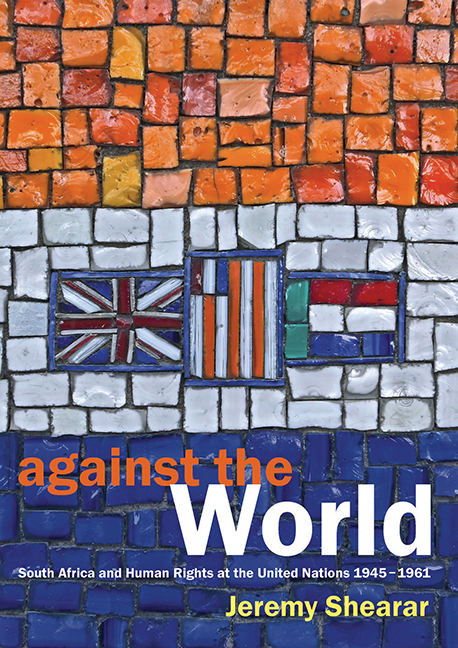Book contents
- Frontmatter
- Contents
- Acknowledgements
- Abbreviations
- Introduction: ‘What we have lost is all the more reason for cherishing what survives’
- 1 Quod severis metes: Birth of the United Nations
- Chapter 2 South African Indians
- 3 Universal Declaration of Human Rights
- 4 International covenants on human rights
- 5 United Nations surveys of human rights issues
- 6 Evolution of human rights at the United Nations
- 7 State sovereignty at issue
- 8 Apartheid on the agenda
- 9 Shadow of Sharpeville
- 10 General relations with the United Nations
- 11 Concluding observations
- Appendix: Selected provisions of the United Nations Charter
- Sources and references
- Index
10 - General relations with the United Nations
Published online by Cambridge University Press: 19 March 2020
- Frontmatter
- Contents
- Acknowledgements
- Abbreviations
- Introduction: ‘What we have lost is all the more reason for cherishing what survives’
- 1 Quod severis metes: Birth of the United Nations
- Chapter 2 South African Indians
- 3 Universal Declaration of Human Rights
- 4 International covenants on human rights
- 5 United Nations surveys of human rights issues
- 6 Evolution of human rights at the United Nations
- 7 State sovereignty at issue
- 8 Apartheid on the agenda
- 9 Shadow of Sharpeville
- 10 General relations with the United Nations
- 11 Concluding observations
- Appendix: Selected provisions of the United Nations Charter
- Sources and references
- Index
Summary
General Debate
A standard method for a member state to express its views in the UN was to participate in the General Debate, which opened each session of the GA and served as a barometer of international relations. A delegation could comment on any aspect of international affairs and often used the opportunity to explain its country's policies over the past year or to criticise shortcomings in the organisation. The General Debate could also reflect relations between individual members. It was a tool SA did not employ to best effect. During most of the period covered by this work, the DEA officials asked in vain to be allowed to play a more constructive role in the work of the UN. When the Union government finally acceded to their request in 1958, the changed membership of the organisation and the abrasive tactics employed by the Minister of External Affairs rendered the effort futile. This chapter surveys the deterioration of the NP administration's relations with the UN.
SA's early participation
After the NP victory in the elections of May 1948, the DEA prepared a brief on the UN for the Minister of Economic Affairs, E.H. Louw, who was appointed to lead the SA delegation to the 3rd GA. The brief took into account ideas the new administration had expressed in Parliament, but was not so overtly hostile towards the world body. It described the Charter as often abused, but as an ‘admirable document that purported to establish the rule of law for the rule of arbitrary force’. SA applied the rule of law at home and expected the UN to do the same. The Union would not undertake obligations other than those in the Charter, nor accept that the UN's jurisdiction could be made to exceed the ambit of the Charter, either by resolution or by interpretation. The brief stressed that the SA delegation ‘should defend the right of any member, even a critic, to accept or reject a resolution for sound reasons’ [my emphasis]. Constructive participation was the appropriate policy. Criticism from friendly states should be answered tactfully, but if SA were again placed in the dock at the GA, it might have to reconsider its position: ‘No public statement … committing the Union to a particular course of action, should be made without prior Government approval.’
- Type
- Chapter
- Information
- Against the WorldSouth Africa and Human Rights at the United Nations 1945–1961, pp. 218 - 235Publisher: University of South AfricaPrint publication year: 2017



